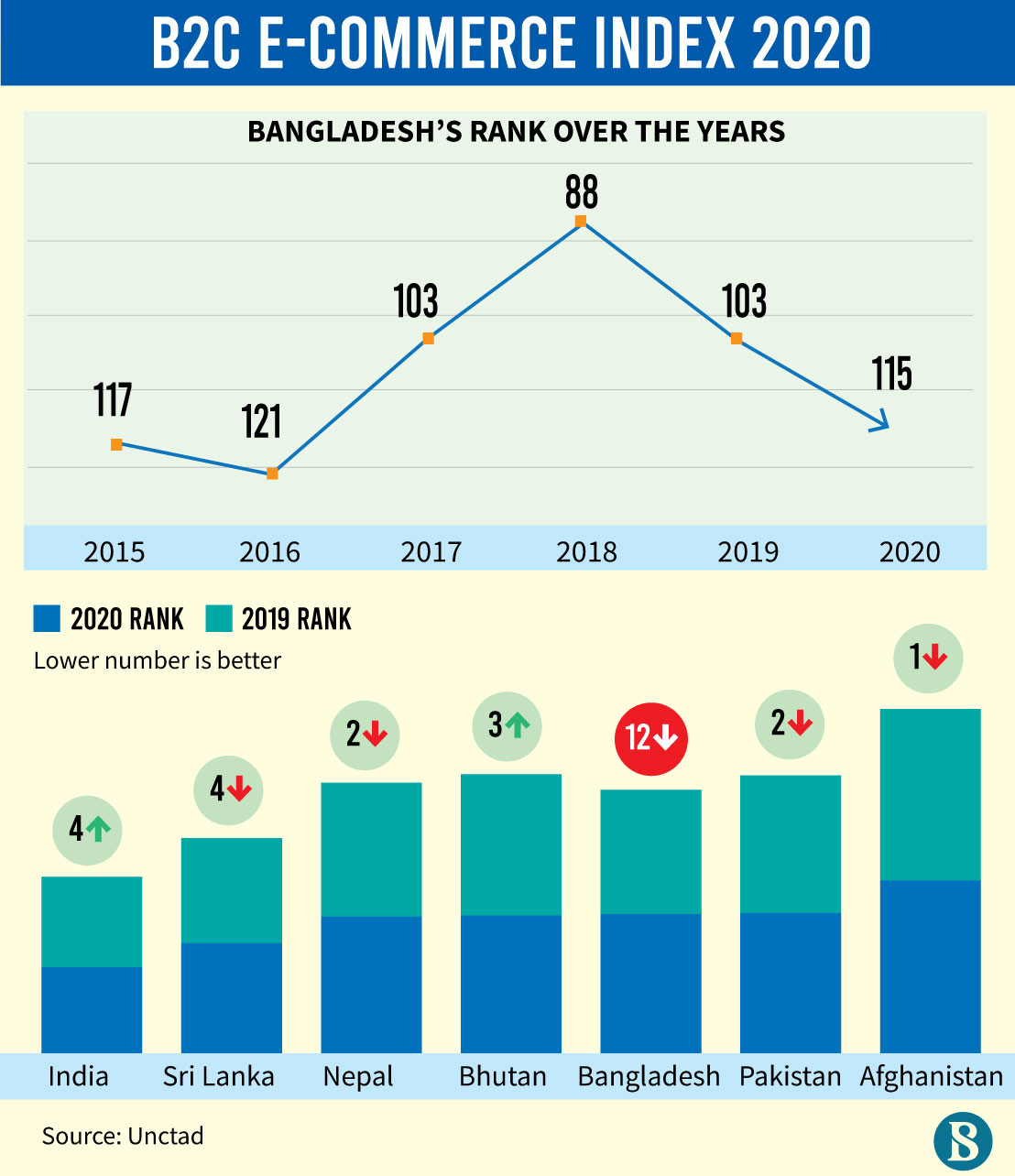Bangladesh’s e-commerce ranking sees greatest drop in South Asia
Despite this, the country has managed to stay ahead of Afghanistan and Pakistan

Bangladesh slipped 12 notches on the United Nations Conference on Trade and Development's (Unctad) Business-to-Consumer (B2C) E-commerce Index 2020, the greatest drop among South Asian countries.
It ranked 115th, falling from 103rd position on the 2019 index. It performed better on the 2018 index where it was in 88th position.
Muhammad Abdul Wahed Tomal, general secretary of the e-Commerce Association of Bangladesh (e-CAB), told The Business Standard the key reason why Bangladesh lags behind in e-commerce is the postal system.
He said e-commerce has flourished through post offices in many countries and it is the largest network as well as the largest delivery platform capable of reaching even remote areas.
"Our logistics delivery channel is not strong enough yet. We should accept that e-commerce products will not be delivered on time. Confidence in our post office has not grown among customers and e-commerce companies yet," explained Tomal.
He said there has not been any significant development in post office services yet.
The e-CAB general secretary said rural and cross-border e-commerce has not flourished in Bangladesh yet either.
"We do not have a cross-border e-commerce policy. As a result, we face so many difficulties in sending something to other countries. The expense also rises," he added.
Tomal identified the country's poor payment system as another barrier, saying it is not interoperable yet and making international payments comes with many limitations.
He said as opposed to other countries, most e-commerce operations in Bangladesh occur in an informal setting, making it impossible to track them.
"For example, we have more than two lakh Facebook-based entrepreneurs who are buying and selling products through e-commerce. But we do not have a single depository containing their exact data," he continued.
"Due to this informal set-up, we are unable to get the structural environment needed to define our e-commerce growth as well as track significant changes," he clarified.
He emphasised faster and affordable internet, and a better educated and skilled manpower for this sector's development.
"We must appreciate that the Covid-19 pandemic came as a blessing in disguise for the e-commerce sector. Transactions reached about Tk16,000 crore last year and over 50,000 entrepreneurs joined the sector," he said.
"The number of customers also increased along with e-commerce websites and companies. This sector is seeing many investments. I would say we achieved in 2020 what we hoped we would in 2024," he added.
India most prepared country in South Asia
India remains, by far, the most prepared country for e-commerce in South Asia. It moved up four notches from its previous year's position to rank 71st globally.
Sri Lanka, the second most prepared country in the region, ranked 91st. Its ranking fell four notches from the previous year.
It was followed by Nepal, with the Himalayan country moving down two places to rank 113th internationally.
Meanwhile, Bhutan's ranking on the index moved three notches up to reach 114th.
Despite experiencing the biggest drop in ranking in the region, Bangladesh managed to stay ahead of Afghanistan and Pakistan.
Afghanistan and Pakistan – the least and the second-least prepared country for e-commerce respectively – saw their rankings drop by one and two notches, respectively.
Unctad, on Wednesday, published the index which ranked 152 nations on their readiness to support online business. The index used 2019 data or the latest available and is based on four indicators: access to secure internet servers, reliability of postal services and infrastructure, the portion of population that uses the internet, and the population segment that has an account with a financial institution or a provider of mobile money services.
Using 2019 data, the report said only 13% of Bangladeshis used the internet that year, the lowest among South Asian countries, and 39 out of every one million people had access to secure internet servers.
Switzerland led the index for the first time, followed by the Netherlands and Denmark. In 2019, 97% of the Swiss population used the internet.
European economies dominate the top 10 list. The only non-European economies among them are Singapore, ranked 4th, while Hong Kong is in 10th position.
Developing countries: Asia leads the group
The 10 developing countries with the highest scores are from Asia. They are classified as high-income or upper-middle-income economies.
At the other end of the spectrum, least developed countries occupy 18 of the bottom 20 positions.
The two largest B2C e-commerce markets in the world, China and the United States, ranked 55th and 12th, respectively. Both countries led in several absolute measures but lagged in relative comparisons.
"The Covid-19 pandemic has made it more urgent to ensure that countries trailing behind are able to catch up and strengthen their e-trade readiness," said Shamika N Sirimanne, director of Unctad's division that prepares the annual index.
She said the index underscores the need for governments to do more to ensure that more people can get e-commerce opportunities.
"Otherwise, their businesses and people will miss out on the opportunities offered by the digital economy. They will be less prepared to deal with various challenges," she added.



 Keep updated, follow The Business Standard's Google news channel
Keep updated, follow The Business Standard's Google news channel
















